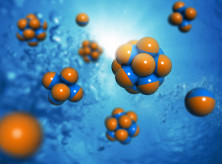 Imagine your book case could construct itself without you moving a single finger. What might sound like science fiction, happens in fact every day in nature on a microscopic scale, for example when cell membranes are formed or you wash your dishes. Designing and engineering such self-assembling materials is one of the major challenges in soft matter, and holds immense promise for the large-scale fabrication of novel nanomaterials and pharmaceutics. In our group, we study the fundamental principles of these intricate systems using advanced theoretical and computational methods. In particular, we focus on the role of external fields on self-assembly, and the possibility to guide the building blocks into well-specified structures. For more information, contact Arash Nikoubashman. Imagine your book case could construct itself without you moving a single finger. What might sound like science fiction, happens in fact every day in nature on a microscopic scale, for example when cell membranes are formed or you wash your dishes. Designing and engineering such self-assembling materials is one of the major challenges in soft matter, and holds immense promise for the large-scale fabrication of novel nanomaterials and pharmaceutics. In our group, we study the fundamental principles of these intricate systems using advanced theoretical and computational methods. In particular, we focus on the role of external fields on self-assembly, and the possibility to guide the building blocks into well-specified structures. For more information, contact Arash Nikoubashman.
|